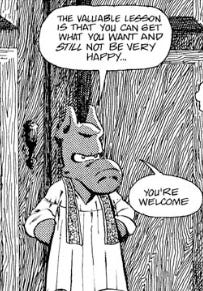End of Summer Housekeeping
Welcome to all my new subscribers - here's what you'll find here and what's new for the fall!
Image: Dave Sim, Cerebus
The end of the summer is sadly, tragically, prematurely upon us. That means that Abu Aardvark’s MENA Academy, like most of its readers and most definitely its author, will be heading back to the classroom, teaching new books, and gearing up on research projects old and new. I’ve been very pleased — heck, I’ve been delighted — at the influx of new subscribers to my blog. Most of you probably missed some of the earliest posts, including the one where I explained what I would be posting and some of the earliest of the book review essays. So this post will be a bit of housekeeping, including some updates on what to expect this fall. I hope that, contra the iconic panel from Dave Sim’s Cerebus the Aardvark, you will get what you want AND be happy!
I won’t overwhelm your inbox. In a typical week you will receive between one and three posts in your email. There will be no “paying subscriber only” posts - the point of the academy is for knowledge to be free, and I’ve been frustrated too many times by platforms where I’ve written or edited being paywalled and inaccessible. That said, I can’t begin to say how much I appreciate those of you who have elected for a paid subscription. I use most of the revenues to buy books which are candidates for the book review essays, and if I ever make more than I need for that then I’ll pour it back into developing the site. A sincere thank you to those paid subscribers - you all know who you are.
Here’s the three types of posts you should expect to see (along with the occasional housekeeping post like this one):
Book Review Essays: I have been thoroughly enjoying writing my weekly book review essays. At the end of this post, you’ll find a full list of all eleven (featuring fourteen books) I’ve done so far. I plan to continue doing them on a weekly basis, as best I can, so I’m always on the lookout for new books on the Middle East. They don’t have to be political science - if you scan the list of books reviewed so far, you’ll see that they range across disciplines such as history and anthropology and Middle Eastern studies.
One change you should expect is we move into the fall is that the review essays will often be connected to a Middle East Political Science Podcast book segment. The twelfth season (!) of the podcast will launch in mid-September and then be produced weekly (except for some holidays) until the end of the academic year. Every episode has a thirty minute book segment, where I talk with authors about new books; last season we had 33 episodes and I expect roughly the same this year.
Topical Posts: Occasionally, as with my posts on Gaza, the Abraham Accords, and Tunisia’s referendum, I will post topical essays featuring my own commentary and analysis. I’ll often also include a list of recent publications on the topic, mostly books and academic articles plus the occasional policy report. It’s nice for me to have this blog-style outlet again, but I don’t plan to overdo it — and I’ll generally try to make sure that the piece has an academic dimension, such as the attached reading lists.
One special subset of these posts will by my Hidden Curriculum series. These posts, like the first one on submitting to academic journals, will focus on offering practical advice to early career scholars. They will generally be based on talks that I’ve given at POMEPS professional development workshops, supplemented by my conversations with experienced people in the field (last time, half a dozen journal editors). The next one of these will focus on submitting book proposals to academic publishers. I’m always open to suggestions about topics which readers would like to see covered.
Guest Contributors: One exciting new thing I have planned for the fall is the occasional guest contributors. My plan is to start doing short interview style posts, where scholars answer a series of questions about something related to their research, a new publication, or current events. These may also have some integration with the podcast, but we’ll see how it works out.
Thank you again for subscribing to or just reading Abu Aardvark’s MENA Academy. I’ve been totally enjoying having a blog again, I’m beyond thrilled at the reception, and I look forward to putting out material of interest to the broad Middle East Studies community over the coming year.
Previous Abu Aardvark book review essays:
Worldmaking After the Ottomans: Jonathan Wyrtzen’s Worldmaking in the Long Great War: How Local and Colonial Struggles Shaped the Modern Middle East
A History of False Hope: Lori Allen’s A History of False Hope: A Century of Investigatory Commissions in Palestine
Sudan’s Revolutionary Struggle: Willow Berridge, Justin Lynch, Raga Makawi and Alex de Waal’s Sudan’s Unfinished Democracy.
Imperial Mecca: Michael Christopher Low’s Imperial Mecca
Sexting Like a State: Maya Mikdashi’s Sextarianism; John Nagle and Tamirace Fakhoury’s, Resisting Sectarianism
A New Political Economy of Islamism: Khalid Medani’s Black Markets and Militants
Man, the State, and Bread: Jose Ciro Martinez’s States of Subsistence
Where, and Why, is North Africa? Majid Hannoum’s The Invention of the Maghreb and Megan Brown’s The Seventh Member State
Why Does MENA Transitional Justice Fail? Mariam Salehi’s Transitional Justice in Progress
Why did Egyptians Cheer a Massacre? Mona el-Ghobashy’s Bread and Freedom and Justin Grimm’s Contested Legitimacies.
Jordan, Forever on the Brink… of What? Jillian Schwedler’s Protesting Jordan



